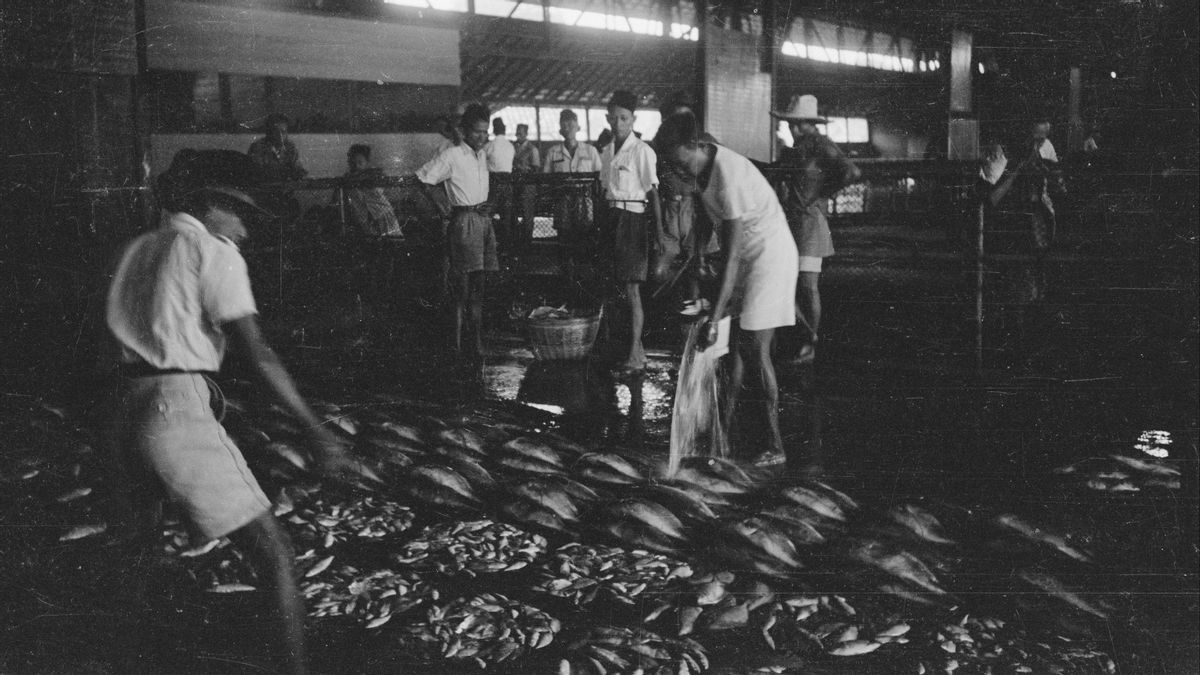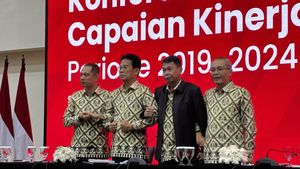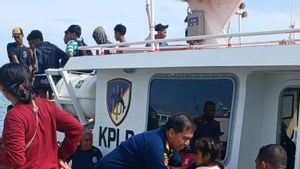JAKARTA - The Chinese New Year or Chinese New Year is a big event. In Jakarta, Chinese New Year is celebrated lively. Chinese New Year is often decorated with lion dances, tanjidor, and xylophone chromong performances. Another thing that the Betawi-Chinese community should never miss is the presence of processed milkfish at the mechanic's table.
This habit is enduring thanks to the tradition of "Nganter Bandeng" which has been practiced by the Betawi people for a long time. This tradition to legitimize Chinese New Year celebrations would not be complete without milkfish.
For ethnic Chinese, milkfish which has many thorns actually symbolizes abundant fortune / prosperity. This is because in Chinese fish is yu which means fortune.
Meanwhile, pindang milkfish called Nian Nian You Yu means excess sustenance every year. Therefore, fish often appear as Chinese New Year decorations or ornaments, icons on greeting cards, fish-shaped dodol, and fish dishes.
“During the banquet, a fish dish (milkfish) is served at the end of the meal as a symbol of hope for abundant fortune in the future. The bigger the size of the fish, the greater the sustenance that will be obtained in the future, "wrote the Indonesian Culinary Academy in the book Kuliner Betawi: Selaksa Rasa & Cerita (2016).
Starting from the Betawi traditionEven so, the presence of milkfish in every Chinese New Year celebration is closely related to the traditions of the Betawi people from long ago. Betawi people on big days often use milkfish as a delivery from their prospective son-in-law to their future in-laws.
The milkfish that were brought were not in processed form. However, it is still a fresh, raw whole fish. The tradition then developed when there was a cultural marriage which made Chinese people also perpetuate the "nganter" tradition.
Abdul Chaer in the book Betawi Tempo Doeloe (2015) explains that nganter culture is closely related to Betawi culture. Literally nganter means delivering something to other people, such as to neighbors or other people who should be given a queue (parents-in-law, grandmothers, etc.).
This tradition is enduring because there is a high social value it contains in the form of building kinship or friendship. Not only that. Anteran special is usually done by a prospective son-in-law to prospective in-laws.
It is called special because through this tradition the prospective in-laws will show their seriousness to the children of the owner of the house. This tradition was later adopted by the Chinese, who on the eve of Chinese New Year, the prospective son-in-law brought milkfish as a queue to the prospective in-laws. The bigger the size of the milkfish that is brought, the greater the seriousness of the prospective son-in-law in applying for the son of the owner of the house.
"On Chinese New Year, the kongcu (youth) who come to the house of the siucia (girl) are required to bring milkfish for their mother-in-law (in-laws). Candidates in law who do not carry milkfish are considered disrespectful of their in-laws and the marriage can be canceled. At that time dating was not as free as now. Many girls are confined, forbidden to leave the house, let alone watch Capgome at night. At that time, the milkfish selling place was on Jalan Bandengan, Glodok, ”wrote Alwi Shahab in the book Saudagar Baghdad dari Betawi (2004).
DeepeningWe contacted a Betawi cultural observer, Masykur Isnan, to find out the deeper meaning of the presence of milkfish at the dinner table during Chinese New Year. According to him, Imlek itself is a culture that cannot be separated from the Betawi people.
In fact, Chinese culture is one of the cultures included in the acculturation of Betawi culture. Which, the Chinese element is an important part of shaping Betawi society. Masykur added that the Betawi people have always praised the values of diversity. This diversity occurs through cultural acculturation. Example of milkfish nganter.
This tradition was then adopted by the Chinese in Batavia (Jakarta) as a manifestation of gratitude and the spirit of sharing. Another form of this tradition is mutual respect and respect for differences.
"Betawi culture and society are proven to be a reflection of openness and tolerance, in fact, Betawi was born from the acculturation of various cultures, Betawi comes with its richness and local wisdom. Therefore, very often at other cultural celebrations, for example Chinese New Year, the Betawi people will also take part, ”Masykur Isnan told VOI, Wednesday, February 10.

For that, the excitement of the Chinese New Year is shared by both Chinese and Betawi people. a commitment to mutual respect and sharing makes this tradition last. Even though nowadays the forms of the queue are starting to vary with the presence of more instant and practical items, of course this cannot replace the values of the milkfish nganter tradition. For example, the crowds of Jakarta residents a week before the Chinese New Year were looking for milkfish in local markets.
"One week before the Chinese New Year until the Chinese New Year arrives, the Rawa Belong T-junction is crowded with milkfish traders and buyers. Buyers who come are not only from among Chinese descent, but also from the people of Rawa Belong. They deliver milkfish to their relatives, especially for in-laws or prospective in-laws. At that time, the traditions of Ramadan and Chinese New Year were celebrated by all residents of Rawa Belong regardless of religion and ethnicity, "said Bachtiar, owner of Sanggar Si Pitung in Rawa Belong as quoted by Windoro Adi in the book Batavia, 1740: Combing Betawi Footprints (2010).

3. Milkfish Pond (Wikimedia Commons)
The English, Chinese, Japanese, Arabic, and French versions are automatically generated by the AI. So there may still be inaccuracies in translating, please always see Indonesian as our main language. (system supported by DigitalSiber.id)









